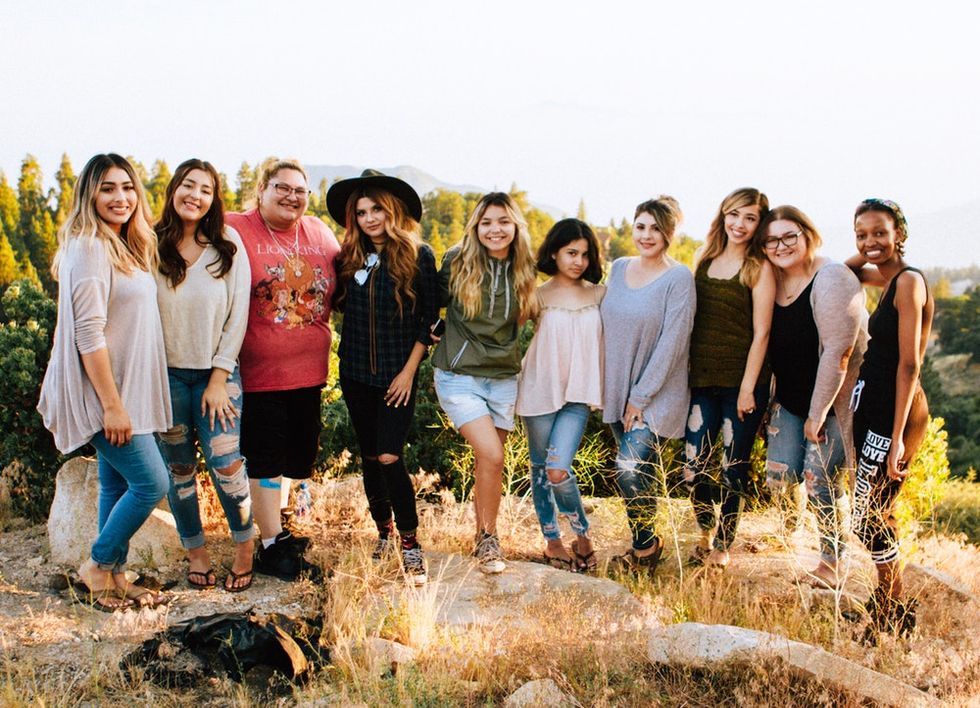Up until very recently, I knew close to nothing about immigration policies, and while I still am in no way well versed in many of the issues this population faces, I recently attended a teach-in at Saginaw Valley State University. This event, hosted by a local group of professors and students known as the Social Justice Rapid Response team, presented information about DACA (Deferred Action for Childhood Arrivals) that is often misunderstood, misrepresented, or misinterpreted. I'm not going to write a long heartfelt article about the struggles that immigrants face because I'm not a member of this population. I can't begin to imagine what it feels like to be an immigrant in this country, but I can share with you what I learned about DACA and what the decisions made on September 5th mean for the future of nearly 800,000 individuals and counting.
First, some background information on the program: Under the Obama Administration, the Deferred Action for Childhood Arrivals was created on June 15th of 2012. Contrary to what some may think, this program was never meant as a permanent means for immigrants to remain in this country. Individuals who applied for DACA were essentially seen as non-priority for deportation. DACA recipients would gain a work order, the ability to attend college, and were under protection for two years at a time.
Sounds like a valuable program at the surface level, and for many, it has provided countless opportunities. However, not everyone was fortunate enough to meet application eligibility. Requirements for application included, but were not limited to, living in the U.S. for at least five years, being under the age of 31, having a clean criminal record, and being in or having finished high school (or a GED). The narrow eligibility that must have been met to apply for this program is important to understand when addressing the idea of the "deserving immigrants." It's like the phenomena of the "deserving poor" in which we look at some individuals as being more deserving of our aid and compassion because of factors that really have nothing to do with an individual’s worth, and more to do with our perception of their situation. The reality of a situation is always more complicated than our perception of it, so to assume we can decide who is "deserving" in a situation we never have and never will find ourselves in, is the epitome of privilege.
Addressing the myths that arise around DACA is an important step in understanding the program for what it truly is. One common myth that surrounds the program is that DACA encourages illegal immigration. This is not true, as a clean record is a mandatory key in the eligibility of a candidate. Another myth surrounding DACA is that the allowance for immigrant workers has taken jobs away from "hard-working American citizens." This is proven false in "the lump of labor fallacy" under economic theory. There is no fixed amount of jobs as jobs are being created and lost through the market all the time based on a number of different factors. In the United States, we have seen a double in the labor force from 1970 to 2017 and we have doubled our employment rather than facing a 50% unemployment rate.
A myth surrounding the benefit that taxpayers could reap in the repeal of DACA is also false. On average, immigrants pay more taxes than they do comparably so they cannot reap any benefits because they are not eligible for any social welfare programs, although they pay into them The myth that repealing DACA will protect citizens from immigrant criminals is untrue on the same grounds as the myth on illegal entrance to the country. In order to be considered for eligibility, individuals must have clean records, and if an arrest occurs, even with no conviction, DACA eligibility can still be withdrawn. Of the 800,000 recipients, under 3,000 (less than 1%) have been dismissed from the program due to public safety or criminal activity.
So what happened on September 5th? The decision was made, under the Trump Administration, that new DACA applications will not be accepted. Any recipients whose applications have already expired are ineligible for renewal, as are any expiring after March 5th, 2018. Those within the window of eligibility have until October 5th, 2017 to re-apply for a two-year renewal. Here are a few barriers to consider:
1. The re-application process costs $500 dollars. I don’t know many people who have 500 extra dollars that can be made within a month.
2. They have only a month to find and utilize the appropriate resources necessary to complete the re-application process.
3. They have to complete steps one and two under mass scrutiny and discrimination from the public.
4. Without DACA, about 6,500 people in Michigan alone will not have the ability to work, obtain an education, or be issued a driver’s license.
5. Something as simple as driving without a license is enough for an immigrant to be arrested on and led to deportation – even if the initial stop was based on stereotypical means.
These are only a handful of barriers that immigrant populations will face due to the end of the DACA program. A poll done by NBC news concluded that nearly 2/3 of Americans support the continuation of DACA, therefore the question stands: Why is it "time" for this program to end? Who will benefit from the end of this program? And at what cost?
In Michigan, there are resources available to advocate on behalf of this population and learn how you can get involved:
1Michigan.org - A Detroit based group of immigrant youths educating and advocating for immigrant populations.
Michiganunited.org - Provides information on addressing legislation about this decision and gives scripts to contact legislators.
Unitedwedream.org
Michiganimmigrant.org
YWCA Great Lakes Bay Region - Racial Justice Committee (989) 894-9055
New Ezekiel Project - CRI Task Force (989) 341-3258
Congress (202) 224-4822
Thank you to guest speakers Susan Reed, Managing Attorney of the Michigan Immigrant Rights Center, and Roberto Garcia, Director of the Multicultural Student Affairs at SVSU for their time, information, and resources and to the Social Justice Rapid Response team for bringing local professionals and students together on this topic.
If you have any other resources or support networks in the area, or in your own, please comment them below. In the meantime, stay informed and stay compassionate.






















